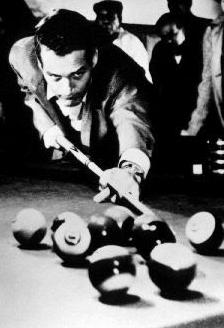Saturday, July 19: Mississippi Mud
FINDING NEVERLAND
by John M. Floyd
Have you ever been reading a book or story and completely lost track of the time? I’m sure you have — it happens to me almost every day. I’ll be reading along and suddenly realize an hour’s gone by, or maybe more. Awhile back Deborah mentioned, in her comment following one of the other CBers’ columns, that when reading stories she manages to shut out the real world almost completely.
 Well, the same thing happens when you write stories. (Those of you who are writers know this already.) Now and then you find that the words just seem to be flowing onto the page by themselves, and (wonder of wonders) they’re all the right words, and it’s as if you can do no wrong. You’re Fast Eddie Felson in the big game — any other night you might not be the world’s best player, but tonight you can hit anything you aim at. (“I’m shootin’ pool, Fats. When I miss, you can shoot.”) But you can’t miss, and you know it, and it’s a great feeling. By the time you wake up from this odd and wonderful trance you’re in, it’s several hours and several thousand words later — and you’re blissfully unaware that any time has passed at all.
Well, the same thing happens when you write stories. (Those of you who are writers know this already.) Now and then you find that the words just seem to be flowing onto the page by themselves, and (wonder of wonders) they’re all the right words, and it’s as if you can do no wrong. You’re Fast Eddie Felson in the big game — any other night you might not be the world’s best player, but tonight you can hit anything you aim at. (“I’m shootin’ pool, Fats. When I miss, you can shoot.”) But you can’t miss, and you know it, and it’s a great feeling. By the time you wake up from this odd and wonderful trance you’re in, it’s several hours and several thousand words later — and you’re blissfully unaware that any time has passed at all.
I’m not joking. This really happens sometimes, when you’re writing, and if you’re lucky and the stars line up just right, it happens often.
Toto, We’re Not in Kansas Anymore
I’ve heard writers refer to this state of happy disconnection as the Zone. Sounds mystical, and fascinating, doesn’t it? Well, I suppose the person who coined the term wanted it to sound mystical and fascinating — but it actually is sort of otherworldly. It’s a great state of mind to be in, this Zone, and much has been said and written about how to attain it.
That process, of course, varies from person to person. Some say it helps to follow a strict writing regimen, to have a certain time and place to write, every day. (I don’t agree with that — I can write anyplace and anytime, but hey, whatever blows your skirt up.) One of my friends says she can sometimes transport herself into this magical realm just by crawling out of bed at five a.m. and parking herself at her writing table. Pretty soon she’s typing away, in an alternate universe. Another friend says he must occupy a specific chair in a specific place on his front porch, with an oversized glass of sweetened tea within easy reach. Another told me his secret lies in making himself sit down to write between midnight and two a.m. at the desk in his home office. If he does that, and does it faithfully, maybe one night in three he will, as the clock’s striking twelve, feel the words start to ooze from his brain into his fingertips, and all he has to do is take down what he’s hearing in his head. Still another swears she must write longhand, with a yellow legal pad, at a designated corner table at Starbucks. (And if that table happens to be taken already, it’s too bad so sad.)
 All this sounds a lot like superstition, doesn’t it. I need my rabbit’s foot, Mom, or nothing good’s going to happen. Well, maybe it is superstition. I don’t much care. If it works, it works. I’ve already pointed out, in an earlier column, that I think fiction writers are a little off plumb anyhow, and it wouldn’t surprise me a bit if our already muddled brains included a little “fun room” with soundproof walls and no ties to the outside world. If it takes a pinch of mental pixiedust to get a manuscript cranked up and running smoothly, it’s fine by me. All that matters is the end result.
All this sounds a lot like superstition, doesn’t it. I need my rabbit’s foot, Mom, or nothing good’s going to happen. Well, maybe it is superstition. I don’t much care. If it works, it works. I’ve already pointed out, in an earlier column, that I think fiction writers are a little off plumb anyhow, and it wouldn’t surprise me a bit if our already muddled brains included a little “fun room” with soundproof walls and no ties to the outside world. If it takes a pinch of mental pixiedust to get a manuscript cranked up and running smoothly, it’s fine by me. All that matters is the end result.
Personally, as I said a minute ago, I don’t seem to need a certain time or a certain place to write — some of what I believe are my best stories have been written sitting on a bench at our two sons’ soccer practices, or in a parked car waiting for our daughter to finish a music lesson, or in an airplane seat or a hotel restaurant or my backyard swing. But there are a few things I do need, and I know I need, for my own Zoning adventures. Relative silence is one of them. As JLW mentioned the other day in his column about multitasking, I don’t listen to music or TV or the radio when I write. I don’t need other people’s words competing with my own, for my attention. At the walking track every day, I let the other sweaty folks listen to their iPods. I’m listening to my own words, in my mind.
Self-hypnosis?
The point is, whether it’s simple or complicated, logical or woo-woo, all of us writers have at least some quirks about the way we dream up, and write down, our stories. My advice is, figure out whatever greases your wheels, and do that. If this euphoric, superproductive Zone really exists, and if it’s such a good place to be in, we should try to give ourselves every chance to get there.
Another thing to remember: When and if you are lucky enough to find yourself in that faraway Oz, writing like a wild man with starbursts of ideas exploding in your mind and brilliant prose spooling itself out on your computer screen — try to stay there as long as possible. It’s not that hard to do. I’ve found that thoughts like food and drink and recreation probably don’t often enter my head anyway, when I’m writing or storydreaming — but if they do, I shove them out again. It might seem reasonable that you should be able to take a breather from something like this, and then hop right back on the bandwagon, but sometimes you can’t. Or at least I can’t.  You might find that when you get back from your break, the fast train’s already pulled out of the station, and left you behind as well. Will it come back by again? Probably so — but maybe not today or tomorrow, or even next week. So when you’re fortunate enough to find yourself frolicking in the wildflowers of your writing Zone, try to stay put. Mine it for all it’s worth. You can catch up on your sleep and your nutrition, and maybe even your day job, later. (Remember what happened to Christopher Reeve, in “Somewhere in Time”? There he was, shacked up with Jane Seymour in 1912, and what did he do? He let himself think, just for a instant, about what was happening back in his other life in 1980, and before he knew it he was back in his other life in 1980, and Jane was, alas, nothing but a fond memory, and as inaccessible as caviar at Moe’s Diner.)
You might find that when you get back from your break, the fast train’s already pulled out of the station, and left you behind as well. Will it come back by again? Probably so — but maybe not today or tomorrow, or even next week. So when you’re fortunate enough to find yourself frolicking in the wildflowers of your writing Zone, try to stay put. Mine it for all it’s worth. You can catch up on your sleep and your nutrition, and maybe even your day job, later. (Remember what happened to Christopher Reeve, in “Somewhere in Time”? There he was, shacked up with Jane Seymour in 1912, and what did he do? He let himself think, just for a instant, about what was happening back in his other life in 1980, and before he knew it he was back in his other life in 1980, and Jane was, alas, nothing but a fond memory, and as inaccessible as caviar at Moe’s Diner.)
Zone Defense
The upside of this unusual state of mind is obvious: pages and pages of good writing. And I’m serious, it’s usually good. Sometimes it’s great writing. The only downside is that visitors to the Zone tend to be late for meals and appointments and bedtime and supposedly-important business meetings. A small price to pay.
Although I’ve waited until now to say anything about it, some of you might be thinking that this lala-land sounds suspiciously similar to an alcoholic stupor. Well, maybe so, but at least there’s no hangover involved, and it’s not expensive, and your breath will smell no worse than it did beforehand. And who knows, maybe even the literary result will be similar, if some of our most famous authors are any example.
I’m reminded of a reply that Faulkner once made, when asked what one of his short stories meant. “How should I know?” he said. “I was drunk when I wrote it.”
Maybe he was just in his Zone.




















GREAT column, John. So agree with the “Zone” theory, as I have lived through those times joyfully! And when I’ve looked back, am astounded by what had happened. I have found this to be true in writing as well as painting. Only time I would leave was to go to the bathroom. I think most writers/artists will agree. Just wish it happened more often. But it’s awesome when it does!
I have often seen the “Zone” concept applied to programming. Both programming and writing are creative endeavors (or at least they should be). I remember one particular time when I suddenly realized that five hours had passed. The programming had been going so well that I never even realized that the time had passed.
I think it’s fitting that the trance we experience when we read a story is similar, in a way, to the one the writer experiences when he/she creates that story. And I also feel that the stories that give me the greatest feeling of “disconnection” while they’re being written are the ones that turn out to be the best stories. (Maybe the fact that I walk around in a daze half the time isn’t so bad after all.)
I was interested to see the comments about a similar feeling while painting, and programming. Time indeed flies when you’re having fun.
Wonderful column. I loved ‘Storydreaming.” I experience the Zone more often when I am plotting a story out than when I am writing it. Walking around with a dumb grin on my face thinking about murder…
My ADD ‘experts’ explained it’s called “hyper-focusing”, and, uh … What were we talking about?